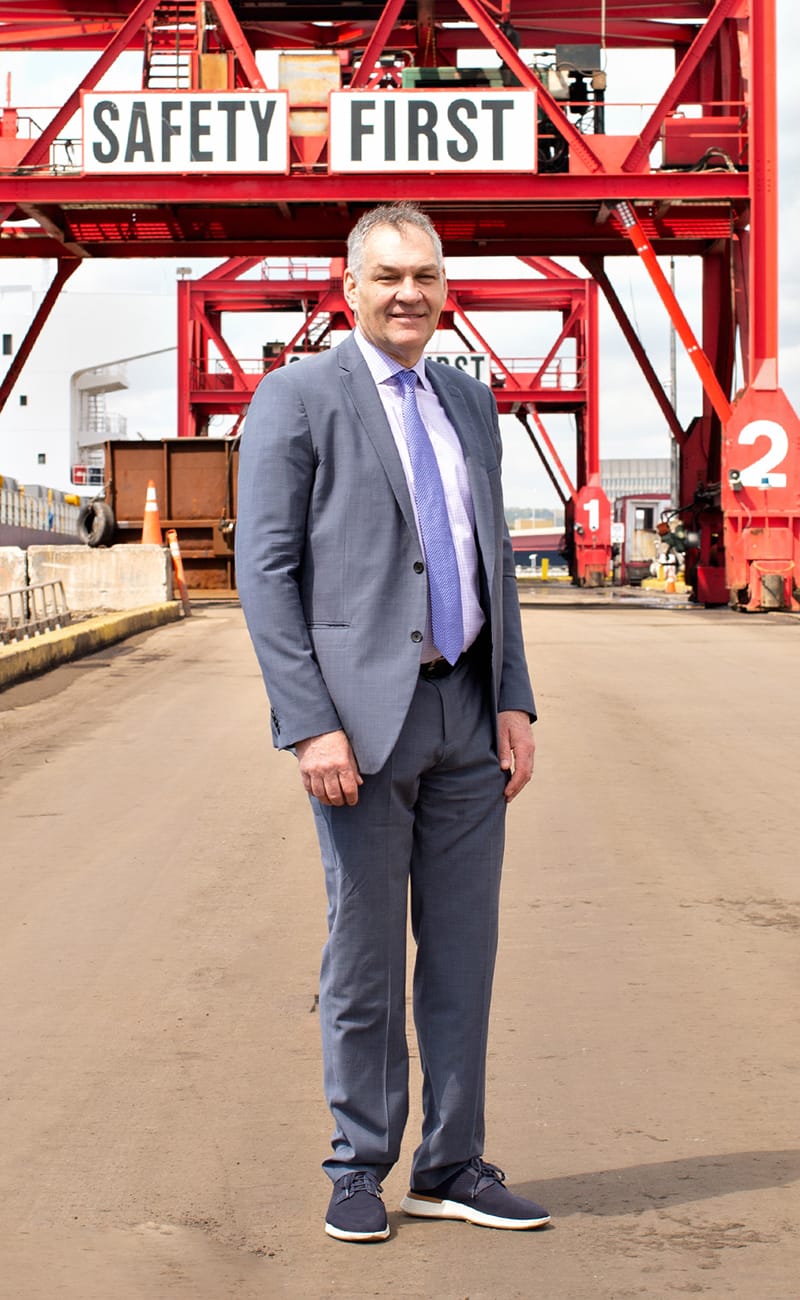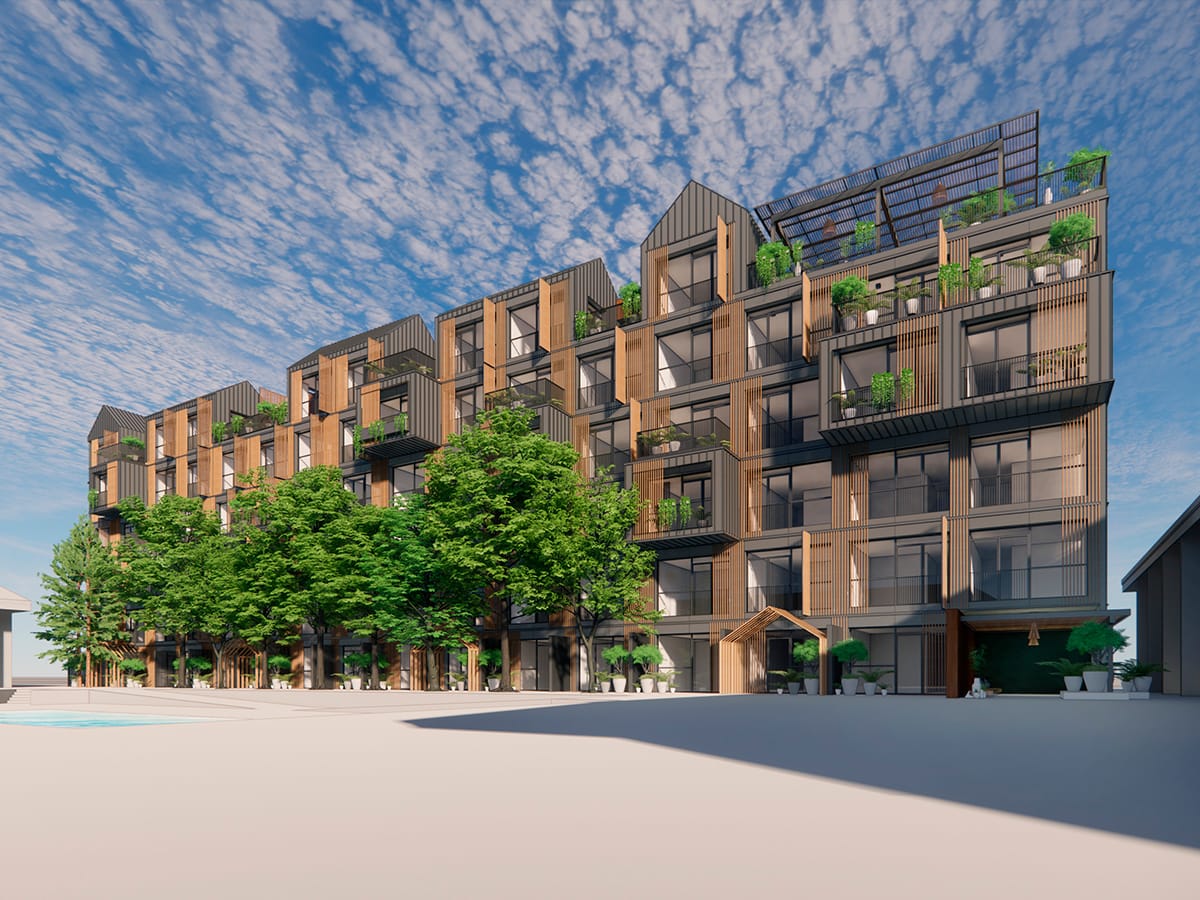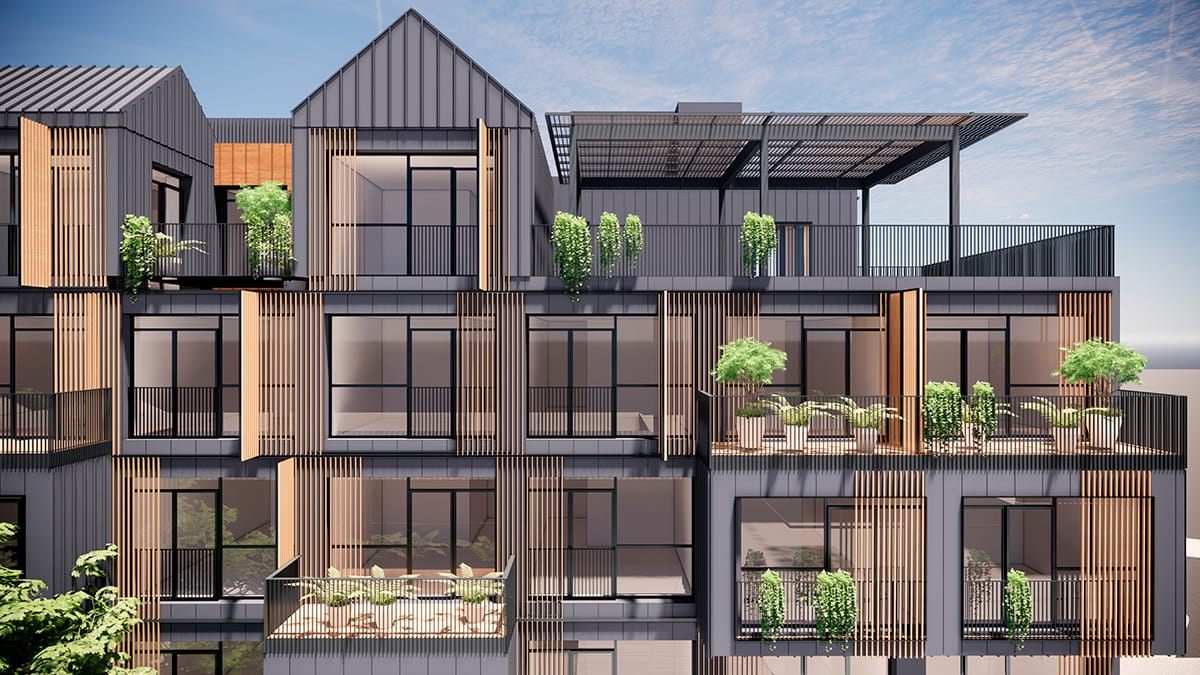FullStack Modular’s Bicoastal Moves Are Making Waves
A New HQ in CT and a Project With Starwood Capital in CA
As Founder and President of FullStack Modular, Roger Krulak has overseen the company’s growth since its inception in 2016. The firm has moved from its first factory in the Brooklyn Navy Yard to a new home in Hamden, Connecticut—all while establishing a flourishing factory in Portland, Oregon.
FullStack Modular has been in Connecticut since late April 2023, getting set up portside at Gateway Terminal. The company has been quick to establish contracts with the state government, providing design and manufacturing options for affordable housing and a myriad of other projects.
“Connecticut is very pro-development and have been great partners since our arrival in Hamden,” said Roger. “The business environment there is very proactive in encouraging new ways to meet their housing needs. So that’s super exciting, and our participation in that is growing.”
In Portland, FullStack Modular is collaborating with the city’s public transportation agency, TriMet, in an effort to develop housing near its rail lines. Roger says it’s all part of his bigger vision to optimize and improve the construction process to propel the industry forward.
“Manufacturing is a process of continuous improvement. The first time we build something, it’s never as efficient as the fifth time we build it. Industrialized construction embraces this approach and we are happy to see that the built environment is finally open to utilizing industrialization and offsite construction to help solve for what seems like an unrelenting demand,” he said.
“Is there a better way to do this? Over the years, I have become very fond of that mindset and process. And I think that the industry as a whole is finally starting to embrace change in order to move the industry forward.”
All the changes and expansions to the business have given Roger a better understanding of the value of continuous improvement, especially as factories adopt robots and automation to increase their speed and efficiency.
Know Your Process Before Introducing Automation
Having been in the business for over 15 years, Roger has seen a lot of successes and failures in the industry. These days, he says, anyone looking to expand or work in modular manufacturing needs to focus on owning their design and process before introducing automation.

Roger Krulak, founder and president of FullStack Modular. Photo credit: Riverstone Images Studio.
“First, know what your product is and know how you’re going to build it effectively,” he says. “Second, make sure that your factory can accommodate the needs of your product and your process.”
Roger notes that automation—without knowing your process inside and out—could lead to larger financial mistakes down the line. While mistakes are unavoidable, there are some costly ones that manufacturers can and should be wary of.
“I see that mistake made literally every day of the week. They buy a bunch of robots, and they build a window plant that can make 8,000 windows a week, but you can’t even use 8,000 windows in three months,” he says. “Nothing’s going to be perfect, and continuous improvement is imperative. One thing I’ve heard too many times is, ‘I’m buying a bunch of robots, and then I’m going to figure out how to use them.’ Do not do that!”
With these experiences and lessons learned, FullStack Modular’s dedication to sustainability and process yielded their latest project for the Portland factory: a sustainable hotel for Starwood Capital Group in Sunnyvale, California.

A rendering of Starwood Capital Group's first modular Treehouse hotel in Sunnyvale, CA, manufactured by FullStack Modular. Opening is scheduled for late 2024.
Related Listening:
Notes From a Growing Manufacturer: New Projects and Lessons Learned w/ FullStack Modular
Roger Krulak, founder of FullStack Modular, joins the podcast to talk about the growth of his modular manufacturing company and the exciting projects FullStack and its partners have in the pipeline.
Roger also shares some of the lessons learned from his career in modular and gives advice to up and coming modular manufacturers.
Chasing Sustainability Highs in California
The six-story Treehouse hotel features 200 modules and 143 rooms, all done in coordination with Starwood Capital Group, who, as Roger says, has embraced many of the tenets that make modular work better. The private investment company was looking for a firm that could build in California not just with sustainability in mind, but also climate resiliency in a high seismic zone.
In fact, FullStack Modular’s focus as a mid-to-high-rise all-steel construction modular company resonated with Starwood Capital Group’s plans to create the first Treehouse hotel in the U.S.
“They interviewed every modular company in the world,” said Roger. “It sounds funny, but I’m totally serious. They felt like our unique approach to offsite construction provided them a long-term solution.”
“Our system is seismically responsive, wind responsive, and adaptable to almost every condition,” said Roger. “From whatever our mods sit on all the way through the parapet, it’s all mods, stairwells, elevator shafts, [and] there are no concrete cores in FullStack Modular’s system. It’s all steel and cement floors. Then, it’s all bolted together on-site.”

Manufacturing Modules in Portland Bound for California
After working with Starwood Capital Group on the overall design and goal, the Portland factory set to work on developing six different varieties of modules. With FullStack Modular’s system of building with double-loaded corridors, the construction and building process looks to be quick. Roger says the company is aiming to assemble the six-story building over the course of one month once all the modules have arrived via truck from Portland to Sunnyvale.
While the Portland factory is working on these modules, the project took a bit to get started. COVID delays related to the hotel business—namely financing and knowing when to officially start—plagued the manufacturer, on top of supply chain delays.
In all, the timeline is now set to deliver the modules in April or May of 2024. The goal is to have the hotel open by the end of 2024.
About the Author: Karen P. Rivera is a freelance writer and editor with a passion for storytelling. She is a former United Nations-based reporter, with experience covering international breaking news, venture capital, emerging healthcare tech, and the video game industry.
More from Modular Advantage
AoRa Development Aims for New York’s First Triple Net Zero Building Using Modular Methods
More cities are providing funding for newer infrastructure projects as long as they meet sustainability requirements. This is how modular can fit the bill, thanks to its lower waste production.
Developers and Designers: Lessons Learned with Modular Design
Modular construction is attractive to many developers because sitework and module construction can occur simultaneously, shortening the schedule and reducing additional costs.
UTILE: Putting Modular Building on a Fast Track
In Quebec, UTILE is taking the lead in creating affordable modular buildings to help decrease the student housing shortage. During the process, the company discovered what it takes to make the transition to modular building a success.
Sobha Modular Teaches Developers How to Think Like Manufacturers
With its 2.7 million square foot factory in UAE, Sobha Modular is bringing both its high-end bathroom pods to high-end residences to Dubai while developing modular projects for the U.S. and Australia.
RoadMasters: Why Early Transport Planning is Make-or-Break in Modular Construction
In modular construction, transportation is often called the “missing link.” While it rarely stops a project outright, poor planning can trigger costly delays, rerouting, and budget overruns.
Navigating Risk in Commercial Real Estate and Modular Construction: Insights from a 44-Year Industry Veteran
Modular projects involve manufacturing, transportation, and on-site assembly. Developers must understand exactly what they are responsible for versus what they subcontract. Risk advisors should research the developer’s contractors, subcontractors, and design-build consultants—especially the modular manufacturer.
Art²Park – A Creative Application of Modular and Conventional Construction
Art²Park is more than a park building—it’s a demonstration of what modular construction can achieve when thoughtfully integrated with traditional materials. The use of shipping containers provided not only speed and sustainability benefits but also a powerful structural core that simplified and strengthened the rest of the building.
Building Smarter: A New Standard in Modular Construction Efficiency
Rising material prices, labour shortages, expensive financing and tightening environmental rules have made conventional construction slower, costlier, and more unpredictable. To keep projects on schedule and within budget, builders are increasingly turning to smarter industrialized methods.
Resia: Breaking All the Rules
Resia Manufacturing, a division of U.S.-based Resia, is now offering prefabricated bathroom and kitchen components to industry partners. Its hybrid fabrication facility produces more precise bathroom and kitchen components (modules) faster and at lower cost than traditional construction. Here’s how Resia Manufacturing does it.
How LINQ Modular Innovates to Bring Modular To The Market in the UAE and Beyond
LINQ Modular, with an office and three manufacturing facilities in Dubai, is a modular firm based in United Arab Emirates. The company is on a mission: to break open the housing and construction markets in the Gulf Cooperation Council (GCC) area with modular.










